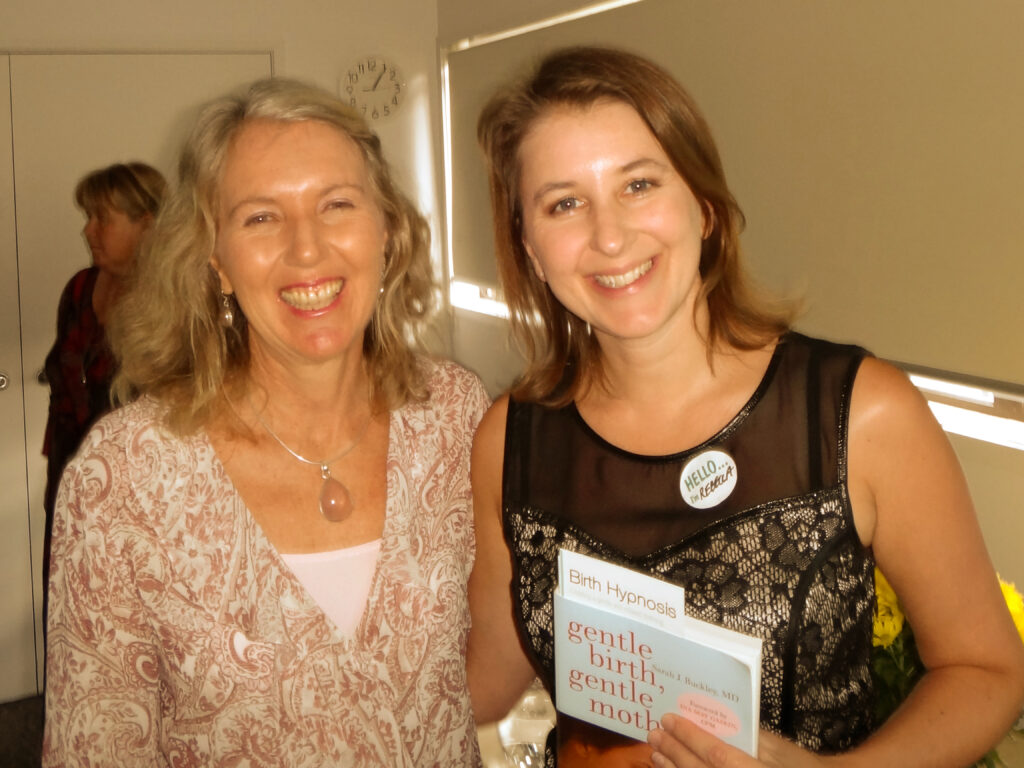
Delighted to meet Dr Sarah Buckley at her Undisturbing Birth Workshop in Auckland
It’s
not often you hear the word ‘birth’ and ‘ecstatic’ in the same sentence. In
fact, we’re more inclined to hear the birthing process illustrated in
less-than-complimentary terms! You’re probably thinking that if you turned up
to coffee group and described your birthing experience using words such as
‘gentle’, ‘pleasure’, ‘peaceful’ and ‘meditative’, that you’d likely get
laughed right out of the cafe.
However,
contrary to birth stories from TV shows and well meaning friends , there is
research to suggest that an ‘ecstatic birth’ is possible. Sceptical?
You might want to hear more about what Dr Sarah Buckley had to say at her
recent ‘Undisturbing Birth’ workshop in Auckland this month.
Expectant mothers, celebrate!
If
you’re an expectant mother, then Dr Sarah Buckley has some good news for you.
She believes birth can be gentle under the right conditions, and has invested
considerable energy critiquing the current practices in pregnancy and
childbirth birth and evaluating the scientific research and anecdotal evidence.
As a
result of her research and clinical practices, Dr Buckley believes that, like
all other mammals, women need certain conditions to birth effectively – that is
to feel private, safe and unobserved. When these conditions are met then our
hormonal physiology creates an optimum orchestration of “ecstatic hormones”
including Oxytocin, Beta Endorphins, Catecholamines, Prolactin, increasing
and/or decreasing at specific stages to help both mother and baby to birth
safely, easily and effectively – and, here’s the exciting part ladies, even
with pleasure!
Happy hormones
In
her book, “Gentle Birth, Gentle Mothering”, Dr Buckley comments that disturbing
or “interfering with this process will also disrupt this delicate hormonal
orchestration, making birth more difficult and painful, and potentially less
safe”. On top of this, when these ecstatic hormones function at their
optimum, not only do they ease pain and increase pleasure, but they promote
beneficial post-birth behaviours such as breastfeeding and attachment.
These
hormones are primarily produced in the limbic system of our brain, otherwise
known as the emotional brain. This is the area of our brain that controls
emotions, behaviours, learning, motivation and memory. Conversely, the
functions of our neo-cortex, known as the rational brain, include conscious
thought and rational and intellectual thinking.
It’s
this rational thinking, usually the voice of reason, that actually seems to get
us in to strife during birth. Dr Buckley believes that for the ecstatic hormone
orchestration and birth to proceed optimally, women need to let go and get out
of their neo-cortex rational thinking brain, shifting instead into an altered
state of awareness and focused inward attention. It was no coincidence to
me that this is the very definition of the hypnotic state! A key element
of birth hypnosis is
teaching and conditioning my clients to easily access this hypnotic state for
themselves – which they find invaluable during birth.
Time to get Zen
In her book, Dr Buckley points out that “if we were to consider giving birth as the deepest meditation possible, and give birthing women the appropriate respect, support, and lack of disturbance, we would provide the best physiological conditions for birth”.
Sounds
straightforward enough, right? Then why, so often, are the environments we
birth in not conducive to the qualities of making the birthing mother feel
safe, private and unobserved? Thinking of a typical birthing environment in our
western world, a mother will usually be disturbed by circumstances that
increase conscious alertness such as bright lighting, expectations of
rationality – often in the form of questions and conversation, and obtrusive
medical equipment.
Create your own Calm
It
may be that you don’t have full control over the environment you are having
your baby, however there are still things you can do to help create a space
where you can feel more safe, private and unobserved. Reducing disturbance will
help you achieve the optimum orchestration and aid the shift into an altered
state of consciousness, resulting in a more efficient and gentler birth.
Some tips to try:
- Dim the lights
- Cover clocks and technical equipment
- Minimise conversation and avoid questions and numbers as these trigger the rational brain
- Avoid unnecessary procedures and observations
- Take your own comfortable clothes – don’t put a hospital gown on
- Ask your birth partner to manage and protect your birth space, “run interference” as such on unnecessary questioning etc.
- Relaxing music. One of the complimentary audio’s my Shine Hypnosis birth clients receive is hypnotic music that helps trigger and maintain a shift into a deep hypnotic state.
Ready, set, RELAX!
And
in my opinion, most importantly, learn how to relax yourself deeply into the
hypnotic state, so that even if you can’t control elements of your external
environment you can create a peaceful inner environment that helps you escape
the feeling of being observed. Birth is one of the most beautiful human
experiences – create your own space where you can feel private and safe,
relaxed and calm so that you can enjoy the optimal and wonderful orchestration
of birth hormones that Mother Nature designed for us.
